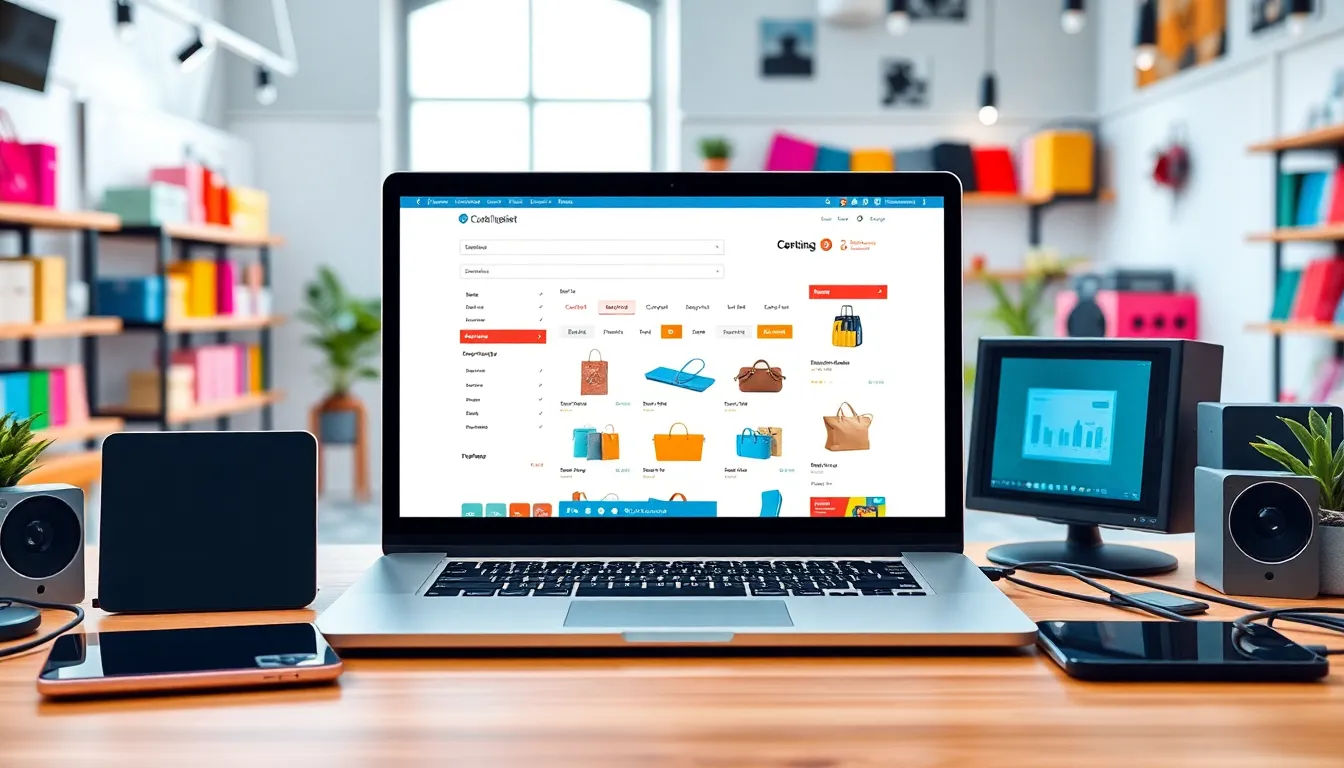In today’s digital marketplace, a SaaS eCommerce platform isn’t just a luxury; it’s a lifeline for businesses looking to thrive. Imagine a world where launching an online store feels as easy as ordering takeout—no more headaches with complex setups or endless coding. With SaaS, entrepreneurs can focus on what they do best: selling their products and charming their customers.
Table of Contents
ToggleOverview of SaaS Ecommerce Platform
SaaS ecommerce platforms offer businesses a cloud-based solution for managing online sales. These platforms eliminate the need for extensive technical knowledge or costly infrastructure. Entrepreneurs can launch their digital storefronts quickly, focusing on products and customer interactions.
Cost-effectiveness stands out as a significant advantage of using a SaaS ecommerce platform. Subscriptions typically include hosting, security, and technical support, reducing overhead expenses. Many popular options, including Shopify and BigCommerce, provide scalable pricing plans.
Customization capabilities enable businesses to tailor their online stores to specific needs. Users enjoy various themes, plugins, and integrations available for enhancing functionality. These tools help in creating a unique shopping experience, fostering customer loyalty.
Analytics features within SaaS platforms offer insights into customer behavior, sales performance, and marketing effectiveness. Data-driven decisions become more accessible, allowing businesses to refine marketing tactics. Advanced tracking options support inventory management, enabling efficient stock control.
SaaS ecommerce platforms also simplify payment processing. They support multiple payment gateways, ensuring diverse payment options for customers. Secure transactions build trust, thus improving customer satisfaction and retention.
Mobile responsiveness is built into most SaaS ecommerce solutions. With a significant amount of shopping occurring on mobile devices, this feature enhances user experience. An optimized mobile site increases conversions, capturing a broader audience.
SaaS ecommerce platforms provide an efficient, cost-effective, and user-friendly route for entrepreneurs. These solutions empower businesses to thrive in the competitive digital marketplace.
Benefits of Using a SaaS Ecommerce Platform


SaaS eCommerce platforms offer significant advantages for businesses in the digital marketplace. These platforms streamline online store management and provide essential tools for success.
Cost-Effectiveness
Cost-effectiveness stands out as a primary benefit of using SaaS eCommerce platforms. Entrepreneurs avoid hefty upfront investments in infrastructure and software. Subscription models typically cover hosting, security, and technical support, minimizing overhead costs. Many popular options provide clear pricing tiers, allowing businesses to choose plans that fit their budget. This financial predictability makes it easier for companies to allocate resources efficiently. Expenses remain manageable, which is crucial for startups and small businesses aiming for growth without breaking the bank.
Scalability and Flexibility
Scalability and flexibility play vital roles in the attractiveness of SaaS eCommerce solutions. As businesses experience growth, these platforms adapt with ease, allowing for increased product listings and traffic without major overhauls. Options for additional integrations and features are plentiful, catering to evolving business needs. Customization capabilities enable entrepreneurs to modify their storefronts within a few clicks, ensuring unique brand experiences. Changes can be made quickly, supporting changes in market trends and customer preferences. With these features, entrepreneurs focus on growth rather than logistical challenges.
Key Features to Look For
Identifying critical features is essential when selecting a SaaS eCommerce platform. The following capabilities enhance user experience and operational efficiency.
User-Friendly Interface
An intuitive interface simplifies navigation for customers and store owners. Platforms featuring drag-and-drop functionality make it easy to design and deploy online storefronts. Additionally, clear dashboards enable users to access key metrics quickly. Search filters and product categorization improve the shopping experience, ensuring visitors can find products effortlessly. Those enhancements lead to higher customer satisfaction, increased conversion rates, and streamlined daily operations.
Payment Processing Options
Various payment processing options are vital for accommodating diverse customer preferences. Platforms that support multiple gateways, including PayPal, Stripe, and Apple Pay, foster trust and encourage purchases. Customers value choices, so integrating numerous payment methods enhances their shopping experience. Security features, like encryption and compliance with PCI DSS standards, protect sensitive information. Reliable platforms ensure smooth transactions, minimizing cart abandonment rates and boosting overall revenue.
Inventory Management Tools
Effective inventory management tools are crucial for tracking stock levels and sales patterns. SaaS platforms that provide real-time inventory updates help businesses avoid stockouts or overstock situations. Automated alerts can remind store owners of low stock levels, allowing for timely replenishment. Integrations with suppliers streamline restocking processes, cutting down on manual tasks. Robust reporting features give insights into product performance, enabling data-driven decisions for feature stock optimization.
Popular SaaS Ecommerce Platforms
Leading SaaS eCommerce platforms cater to diverse business needs. Here’s a look at three notable options.
Shopify
Shopify stands out for its user-friendly interface, enabling quick store setup and management. Entrepreneurs appreciate the platform’s extensive app marketplace, which offers numerous add-ons for enhancing functionality. Automated tools streamline operations, making inventory management and order fulfillment seamless. With built-in SEO features, Shopify helps improve organic traffic. Subscription plans range from $29 to $299 per month, catering to businesses at various stages. Security features, including SSL certification, ensure transactions are safe and trustworthy, boosting customer confidence.
BigCommerce
BigCommerce excels in scalability, making it ideal for growing businesses. The platform supports advanced features like multi-channel selling, allowing integration with marketplaces such as Amazon and eBay. Customization options enable brands to create unique shopping experiences without extensive coding knowledge. Subscription plans start at $29.95 per month, accommodating varying budgets. BigCommerce offers built-in SEO tools, enhancing visibility in search engine results. Additionally, its robust analytics dashboard helps businesses track performance metrics effectively, facilitating data-driven decisions.
WooCommerce
WooCommerce, an open-source solution, integrates seamlessly with WordPress, appealing to users familiar with the platform. Flexibility allows businesses to customize their online stores extensively through numerous plugins and themes. Costs primarily involve hosting and any premium extensions, making it budget-friendly for small businesses. Key features include support for multiple payment gateways, providing customers with various options at checkout. WooCommerce’s community-driven support offers resources and forums, fostering an environment of collaboration. The platform’s scalability accommodates growth, ensuring businesses can expand their online presence efficiently.
SaaS eCommerce platforms represent a game changer for businesses looking to thrive online. With their user-friendly interfaces and extensive features they empower entrepreneurs to focus on growth and customer engagement. The cost-effectiveness and scalability of these solutions make them ideal for businesses of all sizes.
As the digital marketplace continues to evolve choosing the right SaaS platform can significantly impact a business’s success. By leveraging the customization options and analytics capabilities available entrepreneurs can create unique shopping experiences that drive customer loyalty and maximize sales. Adopting a SaaS eCommerce platform is not just a smart move; it’s a strategic decision that positions businesses for long-term success in an increasingly competitive landscape.




